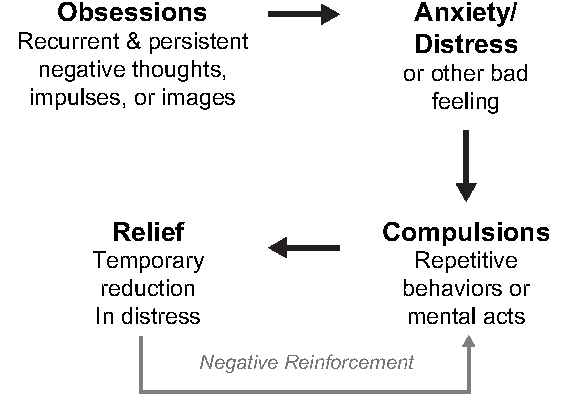Cognitive-behavioral therapy for obsessive-compulsive disorder, or CBT-OCD, is a type of psychological treatment that is the most effective for OCD. In this article, we will explore what CBT-OCD is, how it works, and the benefits it can offer those with OCD.
Contents
Understanding CBT For OCD

Cognitive-behavioral therapy, or CBT, is a type of psychological treatment that focuses on the thoughts, emotions, and behaviors that are affecting a person’s ability to function. CBT is an effective treatment for a variety of mental health conditions, including OCD.
CBT-OCD is an evidence-based treatment that is effective in treating OCD. CBT-OCD focuses on helping the individual to identify and challenge the thoughts and beliefs that are maintaining their OCD. Additionally, CBT-OCD teaches skills and strategies for managing OCD symptoms.
Four Phases of CBT For OCD
CBT-OCD typically consists of four phases. PHASE:
- One: The individual is educated about OCD and how it works. This phase also includes education about CBT-OCD and how it can help to reduce OCD symptoms.
- Two: The individual begins to learn and practice the skills needed to challenge and change their thoughts and beliefs about OCD.
- Three: The individual applies the skills they have learned to real-life situations.
- Four: The individual consolidates the skills they have learned and continues to practice them in order to maintain their gains.
Techniques That It Involves (ERP and CT)
CBT-OCD typically involves two main techniques: exposure and response prevention (ERP) and cognitive therapy (CT).
- ERP is a technique that involves exposing oneself to the thoughts, emotions, or situations that trigger OCD symptoms. This is done in a gradual and controlled manner. The individual works with their therapist to identify their triggers and create a hierarchy of exposures. The exposure is then carried out in a safe and controlled environment.
- CT is a technique that focuses on changing the thoughts and beliefs that are maintaining the person’s OCD. The individual works with their therapist to identify and challenge their negative thoughts. CT also teaches skills for managing OCD symptoms.
Strategies Taught Under CBT For OCD
CBT-OCD typically teaches the following strategies:
- Identifying and challenging negative thoughts
- Exposure and response prevention
- Relaxation techniques
- Stress management
Is It Accompanied By Medication
CBT-OCD can be done with or without medication. In some cases, medication may be recommended in addition to CBT-OCD.
When Medication Maybe Recommended
There are a few instances when medication may be recommended in addition to CBT-OCD. For instance, when the individual:
- Has not responded to previous treatment with medication
- Has very severe OCD symptoms
- Wants to try a combination of medication and CBT-OCD
NOTE: Medication can be an effective treatment for OCD, but it is important to note that it is not a cure.
CBT Treatment Outpatient Vs. Inpatient
- OUTPATIENT CBT: CBT-OCD can be done on an outpatient basis, which means that the individual attends therapy sessions at a clinic or hospital. Outpatient CBT-OCD typically involves weekly sessions for a period of 12 to 16 weeks.
- INPATIENT CBT: In some cases, CBT-OCD may be done on an inpatient basis. This means that the individual would stay at a treatment center for some time. Inpatient CBT-OCD typically involves daily sessions for a period of four to six weeks.
Evaluating CBT For OCD
In a study of individuals with OCD, it was found that those who received CBT-OCD had a significantly greater reduction in OCD symptoms than those who did not receive treatment.
Benefits of CBT For OCD Recovery
- CBT-OCD is effective in reducing OCD symptoms, improving quality of life, and increasing functioning. Especially, CBT-OCD is an effective treatment for those with severe OCD.
- A meta-analysis of randomized controlled trials found that CBT-OCD was more effective than other psychological treatments, such as exposure and response prevention (ERP) and cognitive therapy (CT), and medications.
Biological Effects of CBT-OCD

CBT-OCD has also been found to have biological effects. In a study of individuals with OCD, it was found that CBT-OCD resulted in changes in brain activity. These changes eventually led to reductions in OCD symptoms. For instance:
- Decreased metabolic activity in the right caudate nucleus.
- Decreased right frontal anterior cingulate cortex and bilateral thalamic activity.
Limitations And Criticisms
- CBT-OCD is not a cure for OCD, and it is important to note that there is no one-size-fits-all treatment for OCD.
- Additionally, CBT-OCD may not be suitable for everyone. Some people may not be able to tolerate the exposure component of CBT-OCD.
Why Consider It
CBT-OCD is an effective treatment for OCD that can help to reduce symptoms and improve quality of life. Additionally, CBT-OCD is a relatively short-term treatment that can be done on an outpatient basis.
Finding CBT Therapist For OCD

How To Get Started
If you are interested in CBT-OCD, the first step is to talk to your doctor or mental health professional about whether it is a good treatment option for you. Additionally, they can provide referrals to therapists who specialize in CBT-OCD.
What To Look Out For
- When looking for a CBT-OCD therapist, it is important to make sure that they are proper training and a license.
- In addition, it is important to find one who has experience in treating OCD. As they the treatment needs a proper understanding of OCD.
- Furthermore, you should make sure that the therapist is someone you feel comfortable with.
Red Flags To Avoid
There are a few red flags to avoid when looking for a therapist to provide CBT-OCD.
- First, you should avoid therapists who say that they can cure OCD.
- Second, you should avoid therapists who do not differentiate between CBT and CBT-OCD.
- Finally, you should avoid therapists who do not have training in CBT-OCD.
Important Client Characteristics
CBT-OCD is most effective when the client is:
- engaged in treatment
- willing to face their fears
- able to tolerate anxiety and distress
- able to commit to practice outside of therapy sessions
Listing Alternative Therapies For OCD
CBT is not the only type of therapy that can be effective for treating OCD. Other types of therapies that help treat OCD include:
- Acceptance and commitment therapy (ACT): This is a type of therapy that helps you to accept your thoughts and feelings without trying to change them. It also helps you to commit to taking action in line with your values.
- Mindfulness-based cognitive therapy (MBCT): This is a type of therapy that involves learning to be mindful of your thoughts and feelings without judging them.
- Interpersonal therapy (IPT): This is a type of therapy that focuses on your relationships with other people and how they affect your mood.
- Family-based therapy (FBT): This is a type of therapy that involves involving your family in your treatment.
NOTE: If you are considering seeking treatment for OCD, it is important to talk to a mental health professional about what type of therapy may be right for you. While CBT is the most well-studied and effective type of therapy for OCD, there are other types of therapies that may also be helpful. The most important thing is to find a type of therapy that you feel comfortable with and that you feel will be helpful for you.
How Mantra Care Can Help You
If you’re searching for an affordable, convenient, and effective treatment for OCD, consider Mantra Care. Mantra Care is a leading provider of online mental health services. We offer a variety of evidence-based treatments, including CBT-OCD, that can be completed from the comfort of your own home. To get started with Mantra Care, simply sign up for a free account. Once you create an account, you will be able to schedule a consultation with one of our qualified therapists.
Conclusion
CBT for OCD is an effective, science-based treatment that can help you overcome your OCD. It involves learning new techniques to manage your obsessions and compulsions. And it can be done on an outpatient or inpatient basis. If you are considering CBT for OCD, be sure to find a qualified therapist who has experience treating OCD. With the right treatment, you can overcome your OCD and live a healthy, fulfilling life.
If you are looking for affordable Online OCD Counseling MantraCare can help: Book a trial OCD therapy session


